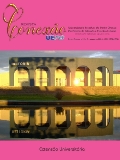JOANA D’ARC FIGHTING FOR DIGNITY: A PRACTICE IN COMMUNITY DEVELOPMENT - DOI: 10.5212/Rev.Conexao.v.12.i3.0014
DOI:
https://doi.org/10.5212/Rev.Conexao.v.12.i3.0014Keywords:
Popular Education, Solidarity Economy, Dialogicity, Militancy, Social Transformation.Abstract
This paper discusses a community development practice conducted for five years (2005-2010) in the Joana d’Arc community, in the poor outskirts of Porto Alegre/RS. This initiative, called Joana d’Arc fighting for Dignity Project, was linked to the Social Development sector of the Pontifical Catholic University of Rio Grande do Sul was sponsored by the Development and Citizenship Program, Petrobras. The project aimed at the improvement of the quality of life of residents through the implementation of a collective enterprise, which offers employment and income generation for a group of women. In addition, it sought a way to problematize the living difficulties and the articulation of the group for the development of a work grounded on collectivity. The methodology was essentially participatory and dialogic. Thus, it was through the establishment of meaningful links, such as caring between educators and students, that daily militancy gained space to encourage autonomy as well as the central role of the community in the process of social transformation. After five years of community actions, the main results were: 37 women trained in bakery and pastry skills; the construction of a place for the collective enterprise as well as an additional space for community activities; acquisition of specific machinery; 19 women trained to work with children as Educator Assistants; and the implementation of a set of interdisciplinary actions that contributed to the improvement of various aspects of community life.
Downloads
References
FREIRE, P. Pedagogia do oprimido. Rio de Janeiro: Paz e Terra, 1987.
FREIRE, P.; HORTON, M. O caminho se faz caminhando: conversas sobre educação e mudança social. Petrópolis: Vozes, 2003.
FREIRE, P.; SHOR, I. Medo e ousadia: o cotidiano do professor. Rio de Janeiro: Paz e Terra, 1986.
GUARESCHI, P. Comunicação e Teoria Crítica. In: ______ (coord.). Comunicação e Controle Social. Petrópolis: Vozes, 1993.
______. Empoderamento. Em: REDIN, Danilo; ZITKOSKI, Jaime (orgs.) Dicionário Paulo Freire. Belo Horizonte: Autêntica Editora, 2008.
______. Psicologia social crítica: como prática de libertação. Porto Alegre: EDIPUCRS, 2004.
LIPOVETSKY, G. A Era do Vazio. Lisboa: Relógio d’Água, 1993.
MORETTI, C. Z. M. Militância. In: STRECK, D.; REDIN, E.; ZITKOSKI, J. (orgs.). Dicionário Paulo Freire. Belo Horizonte: Autêntica, 2008.
SANTOS, B. A crítica a razão indolente: contra o desperdício da experiência. Porto: Edições Afrontamento, 2000.
SANTOS, B. Produzir para viver: os caminhos da produção não capitalista. Rio de Janeiro: Civilização Brasileira, 2002.
SOARES, L. T. Os custos sociais do ajuste neoliberal na América Latina. São Paulo: Cortez, 2002.
SINGER, P. Introdução à economia solidária. São Paulo: Fundação Perseu Abramo, 2002.
SINGER, P. Economia Solidária. In: CATTANI, A. D. (Org.). A outra economia. Porto Alegre: Veraz Editores, 2003.
ZAPATTA, T; Parente, S. O desenvolvimento institucional e a construção de parcerias para o desenvolvimento local. Brasília: Projeto BNDES – Desenvolvimento Local – Cooperação Técnica do PNUD, 2002.
Downloads
Published
Issue
Section
License
a) Authors retain copyright and grant the journal right of first publication with the work simultaneously licensed under a Creative Commons Attribution License that allows others to share the work with an acknowledgement of the work's authorship and initial publication in this journal.
b) By submitting an article to the Revista Conexão UEPG and having it approved, the authors agree to assign, without compensation, the following rights to the Journal: the rights of first publication and the rights to redistribute the article and its metadata to the indexing and reference services that the editors deem appropriate.
c) Readers are free to transfer, print out and use the articles published in the Journal, as long as there is always explicit mention to the author(s) and to the Revista Conexão UEPG and as long as there is no alteration of the original work. Any other use of the texts needs to be approved by the author(s) and by the Journal.






